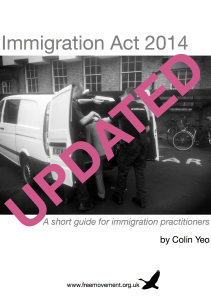- BY Colin Yeo

Immigration Act 2014 Commencement Order No. 3: analysis
THANKS FOR READING
Older content is locked

A great deal of time and effort goes into producing the information on Free Movement, become a member of Free Movement to get unlimited access to all articles, and much, much more
TAKE FREE MOVEMENT FURTHER
By becoming a member of Free Movement, you not only support the hard-work that goes into maintaining the website, but get access to premium features;
- Single login for personal use
- FREE downloads of Free Movement ebooks
- Access to all Free Movement blog content
- Access to all our online training materials
- Access to our busy forums
- Downloadable CPD certificates

Even aside from the issue of an unpublished law purporting to have any effect, the Immigration Act 2014 (Commencement No. 3, Transitional and Saving Provisions) Order 2014 (SI 2014/2711) is a dog’s breakfast. At first blush it appears to bring into effect the new unified removal power at section 1 of the Immigration Act 2014 and the new refugee and human rights only appeal regime. These would be very major changes to immigration law and practice. There are saving provisions, though, and then there is a further layer of “un-saving” provisions and yet a further layer of “re-saving” provisions. Topped by a final “other than” provision. I kid you not.
In short, it transpires that the powers are only brought into effect for two unfortunate groups of migrants. We will therefore have two parallel and identically numbered sets of laws operating for different people at the same time. The new section 10 of the Immigration and Asylum Act 1999 and sections 82, 84, 85 and so on of the Nationality, Immigration and Asylum Act 2002 will apply to those designated in the Commencement Order. For everyone else the old sections 10, 82, 84 and so on will continue to apply. This state of affairs may carry on for some time, perhaps even indefinitely. As we will see below, the terms of the Commencement Order appear to plan for the long term and Broken-shire’s statement to Parliament offered no timescale for full implementation.
This recalls the drafting car crash that has been the parallel sections 88A of the 2002 Act, one version created by the 2006 Act and the other by the 2008 Act and both operating at the same time for different groups even to this day owing to the terms of SI 2008/310. Couldn’t they have been given different numbers?
Who is affected?
The first group of designated migrants for the Immigration Act 2014 powers consists of persons who become foreign criminals as defined by s.117D 2002 Act on or after 20 October 2014 and their families if liable to deportation. The second group broadly consists of students and their families, but only those who make an application for Tier 4 leave on or after 20 October 2014.
Arguably it sends an unhelpful message to be lumping foreign students together with foreign criminals and depriving them of procedural protection in the same way, but there we go..
I say “broadly” because there is specific provision for students re-entering the UK on a different basis (i.e. not Tier 4) so that the new laws do not apply to them. This looks a little bit like some long term planning and it raises the possibility that the removal powers and/or appeal rights might be postponed for other groups, perhaps indefinitely. Maybe someone in Government finally cottoned into the fact that the Immigration Act 2014 appeals scheme actually increases appeal rights for unpopular overstayers and forces reliance on despised human rights grounds. In addition, if a student who has applied for Tier 4 leave on or after 20 October 2014 later makes a human rights or protection claim then the new provisions will apply, unless it is an application made at port.
Other provisions

Consistently with removal of independent appeal rights, the new process of in-country “administrative review” by one official of another official’s work is being introduced for affected students. Who needs judges when the Home Office can simply review its own decisions? The process is set out in a new section of the Immigration Rules and is quite special in its own right. But that is a story for another blog post.
Some of the more sinister and overtly racist parts of the Act are also starting to come into effect, although not yet with full force. The “papers please” landlord checks are to commence in certain West Midlands local authorities from 1 December 2014, as has previously been announced. Smethwick is included, with all the historical resonance of previous battles there.
The powers to make regulations in order to bring into effect the foreign national marriage delay powers are also being commenced. I still cannot understand how the Home Office thinks it can possibly cope with conducting 6,000 investigations a year, which is what it was predicting during the passage of the Bill.
The “health charge” (a sort of visa fee add on) is being lined up with powers commenced in order to lay regulations. Additional powers are being conferred on the OISC to conduct investigations (incidentally, the very existence of the OISC seems to be under review right now).
Home Office guidance
The Home Office has also today published guidance on the new appeals regime and on the transitional provisions. At the time of writing I haven’t had a chance to review it but will either update here or put out a new blog post if it seems deserving.
Want to know more about the Immigration Act 2014? Buy the updated ebook:
[purchase_link id=”14259″ style=”button” color=”green” text=”Purchase” direct=”true”]SHARE


10 responses
for what it’s worth, there’s also new guidance today on the appeals process – including transitional guidance and a ‘consent process map’, whatever that may be – here, https://www.gov.uk/government/publications/appeals.
So it looks like Section 65 was behind the door again (perhaps the one in the basement with the sign on it?) when commencement orders got handed out. This was the clause which was supposed to rectify the injustice of denying automatic citizenship to children born to unmarried UK fathers before 1986. Any thoughts on the next round of commencement orders?
There’s no indication on when there might be more commencement provisions, I’m sorry. I’ll cover it if I hear anything, obviously.
Among the swathe of Home Office policy revisions that have been published today (without the commencement order to which they notionally relate), are revisions to the enforcement instructions and guidance on removals. Chapter 60 (concerning removals and judicial review) includes a new section 19 which makes express the view of the Home Office that, in those cases for which section 1 of the Immigration Act 2014 is commenced, any notice of the person’s removal is now a mere matter of courtesy and should not be anticipated. Removal directions are not to be served on the person to be removed, but only on the carrier. This seems to undermine the principle at the heart of the rulings by the High Court and Court of Appeal in the Medical Justice case from 2010/2011. If this is not concern enough, the lack of a published commencement order spelling out for whom section 1 has or has not been commenced (and the apparent horrendous complexity of the order that is intended) exaggerates the risk that removal without notice will now be pursued including in cases in which current Home Office policy continues to require a minimum notice of 72 hours.
Thanks, Steve, some shocking stuff there, just reading up on it now.
So, no Section 65. I hope that Free Movement gets involved soon on this matter to press the appropriate outlets involved. Since the Labour party never wanted children born out of wedlock before 1 July 2006 to acquire UK passports through their fathers, if this section is left over until after the election and Labour win, we will NEVER EVER in our lifetimes see this amendment commenced. David Hanson will make sure of it.
Hmm. Seems like an abuse of power by the executive to only partially implement legislation (for particular classes of persons only, where such classes of persons were not listed in separate sections of the original legislation). It may well not be technically unlawful, but it still stinks.
Could an overstayer make a combined Tier 4 leave and human rights application? Then when Tier 4 refused (because overstayer of course) appeal on human rights? I suppose the Home Office might just send the form back as invalid or certify though.
Ok, I guess the Immigration Act 2014 s.73 could be read as allowing this…bizarre